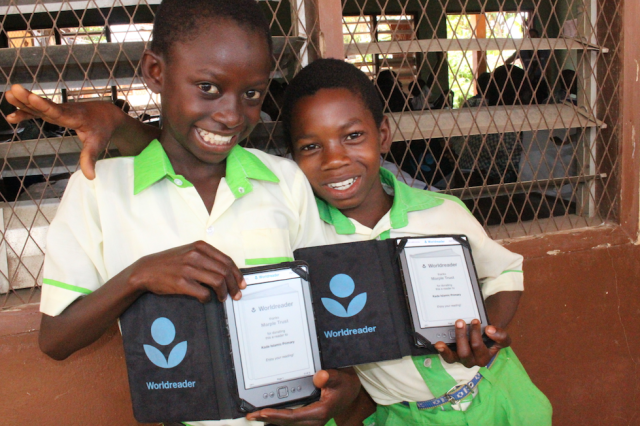Image via Worldreader Blog Page
BY VICTORIA GAFFNEY
While technology is the root of some profound instances of disconnection between people, it’s worth noting that many positive forms of interaction have also stemmed from the digital age, particularly in the nonprofit world. Charitable organizations have increasingly started to soak up technological innovations and approaches to solving societal problems in recent years. From mobile health and telemedicine to educational apps and micro-finance, digital advancements have greatly benefited a number of nonprofits, giving them the tools to create lasting change. The following four organizations are particularly innovative in their uses of technology for tackling today’s most pressing social issues.
WORLDREADER – EDUCATION
Many of us may miss the smell and feel of a paperback, but the advent of digital books has been enormously useful for one nonprofit organization. Worldreader is working towards “creating a literate world.” According to UNESCO, literacy has the power to be a game changer. It can lead to a higher income and help break the cycle of poverty. Despite this great potential, 250 million school-aged children do not have elementary reading and writing abilities and 740 million people are illiterate. As Worldreader tells us, 50 percent of African schools have zero (or close to zero) books.
Worldreader works to increase access to books and the experience of reading. Realizing that the primary way of achieving this is through technology—specifically, e-readers—they launched Worldreader Mobile, enabling anyone with a cell phone or tablet to utilize the organization’s digital library. Worldreader also works on curating books with genres that are accessible to children in different areas—such as books by African or Indian authors—recognizing that the more interested and engaged children are when they read, the more they want to read. Worldreader also provides training for teachers and project managers and they conduct research analyzing their impact. Currently, children in 69 countries are using Worldreader and there are 28,514 books available, translated into 47 languages. Over 40,000 people are reading on e-readers and over 1 million are reading on mobile phones. By providing children with opportunities to immerse themselves in the joys of reading, Worldreader enables them to improve their skills within a few months of joining the program.
CAREMESSAGE – MEDICINE
Based in San Francisco, CareMessage utilizes mobile technologies in an effort to improve healthcare in underprivileged areas. The 501(c)(3) nonprofit focuses on enhancing patients’ ability to self-manage their health (taking medications properly and attending appointments), expanding health literacy, and improving care in general in underserved populations primarily through text messaging. Vineet Singal (CEO) founded CareMessage with Cecilia Corral (VP of Product) and Manuel Rivera. Singal has a background in medicine and has done molecular biology research, while Corral has a design engineering degree from Stanford and Rivera has a telecommunication engineering MS from the Technical School of Madrid (he then wen to Berkeley to learn about technology and social innovation). CareMessage stemmed from Singal’s personal experience at a Galveston, Texas free clinic. As a volunteer, he witnessed the substantial health knowledge deficits of the lower-economic patients. He conferred with Corral and Rivera, and CareMessage was born.
A common misconception about underprivileged populations involves their access and use of mobile technology. According to a Pew Research report from June 2013, there is an 86 percent “mobile phone penetration rate” in American households with an income of less than $30,000 per year (comparatively, only 59 percent have access to a computer and 47 percent to Internet). On their website, CareMessage includes research on the efficacy of SMS technology for improving the health outcomes in underserved populations. According to the studies: of those who received appointment reminders via text 79.2 percent attended their appointments (compared to 35.5 percent for those who did not receive a message); the numbers are similarly convincing for medication reminders (95 percent compliance for those who received texts, compared to 72 percent) and health literacy (75 percent “improvement in treatment adherence” compared to 68 percent who didn’t receive texts).
Through CareMessage’s platform, physicians can send appointment reminders (and receive RSVPs), collect data (from surveys using analytics engine), use filters for demographics or conditions, provide educational programs through texting, and create patient profiles. CareMessage also has handcrafted programs to help patients manage behavior changes (nutrition, medication management), chronic disease (hypertension, diabetes), women’s health (maternal health), pediatric health, and even mental health. CareMessage hopes to help improve the health of more than a million people by 2016 year’s end.
SAMASOURCE – POVERTY ALLEVIATION
We’ve seen how nonprofits are using technology for healthcare and education, but what about poverty alleviation? Enter: Samasource. “Sama” means “equal” in Sanskrit, and sure enough, social entrepreneur Leila Janah founded the organization in 2008 with the goal of working towards global economic equality. Samasource’s vision is “to connect the one billion people living in poverty around the world to work using the power of technology.”
Samasource utilizes a microwork model that rests on the notion that even complicated assignments can be broken down into simple distinct tasks. Through this framework, Samasource provides women and youth with simple digital tasks that are part of a larger data project, enabling them to develop tech skills, while also helping them to make the transition out of poverty. Microwork—falling under the “impact sourcing” or “socially responsible outsourcing” umbrellas—redirects work to impoverished people in undeveloped areas.
Before working through Samasource, 92% of the workers are under-employed or unemployed. Six months of work at Samasource yields an average income increase of 114%; 89% of the workers seek out other work and educational opportunities when they finish at Samasource. Workers are able to make lasting improvements in the lives of their families, including bringing in healthier food, acquiring safer housing, and providing their children with educational opportunities. Perhaps the most positive impact is the fact that “Samasource unites communities through the empowerment of women and youth.”
POLARIS PROJECT – HUMAN TRAFFICKING
It is difficult to believe that slavery exists in our contemporary society and affects 20.9 million people in the world. Katherine Chon and Derek Ellerman were appalled when they encountered an article on the terrible state of a brothel near their campus during their senior year at Brown. When police raided the building they came across six Asian women who were “being held in a situation of debt bondage.” They founded Polaris in 2002, an organization whose name is based on the North Star that 19th century American slaves followed to freedom. One day after Commencement, the Brown graduates moved to D.C. and opened an office.
Katherine and Derek felt that it was crucial to examine human trafficking as a low-risk and high profit practice from a market-based perspective. The goal would be to flip that reality, making human trafficking high-risk and low-profit and so they “built an organization that successfully combines its work on the frontlines serving victims of human trafficking with the creation of long-term solutions that affect systemic and social change.”
In the beginning, Katherine and Derek created a victim outreach program to locate trafficking places and networks, and help victims obtain services. They soon worked with other partners to bring bills to Congress and introduce legislation that protects victims while penalizing offenders. Polaris made the National Human Trafficking Resource Center into a national anti-slavery hotline in 2007, which is available in over 200 languages, and a place where callers can report a tip or receive anti-trafficking services; in March 2013 they established a texting option where victims can text HELP or INFO to “BeFree.” Polaris also works with technology corporations to engender lasting transformation.
 ABOUT THE WRITER
ABOUT THE WRITER
Victoria Gaffney is currently pursuing an MA in Nonfiction Writing at Johns Hopkins in Washington D.C. She is a graduate of Haverford College where she majored in English and developed a passion for words and stories. She enjoys traveling and engaging with new people and perspectives, and relishes the thrill of late nights spent reading a new book or huddling in front of a computer screen to write. In her free time, she can be found drinking copious amounts of coffee, playing with dogs, practicing yoga and wandering around new streets without a plan. Victoria hopes to use writing to help impact positive change. Follow her on Twitter.




